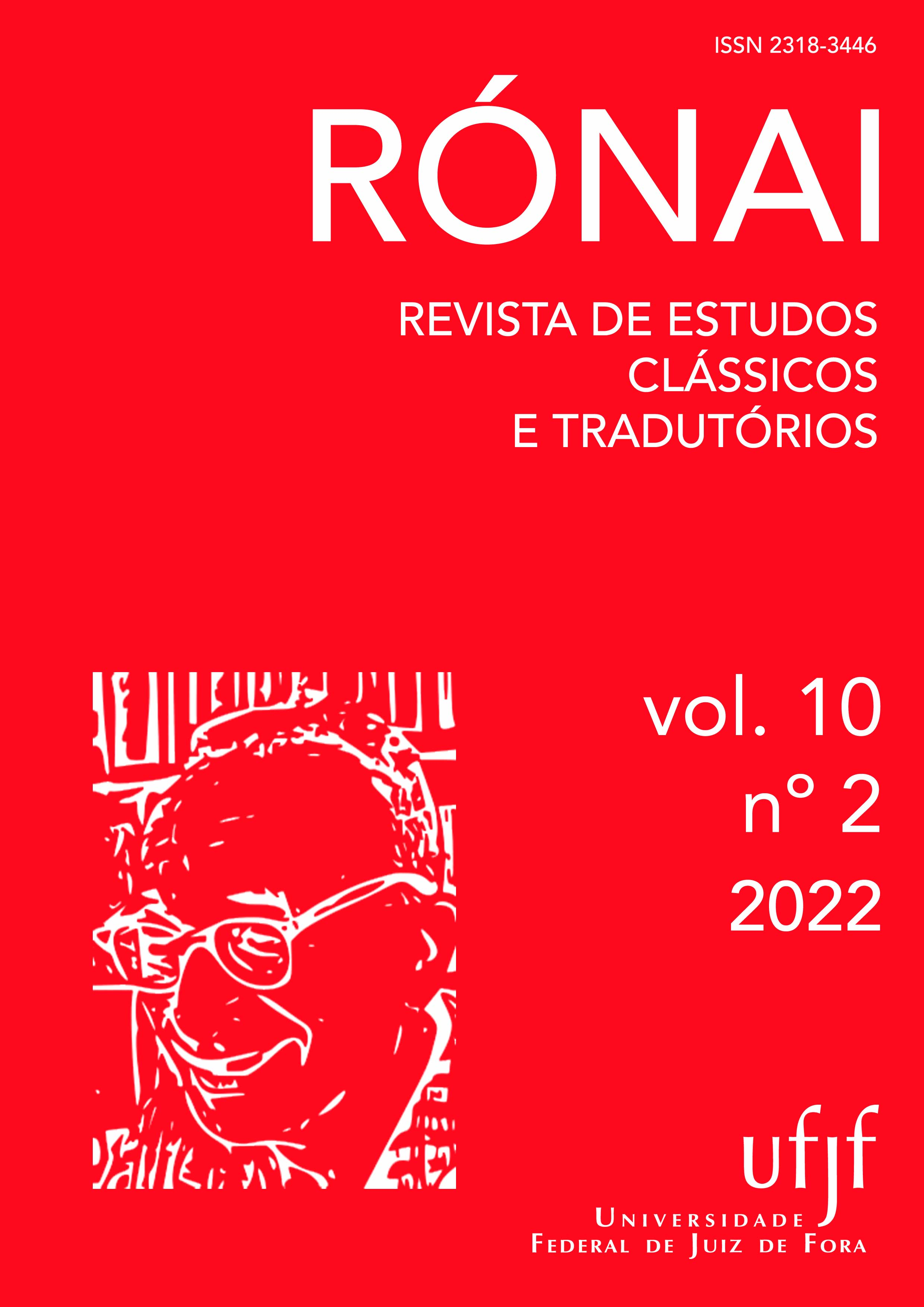The tragedy of Dido and its function in the Aeneid
The tragedy of Dido and its function in the Aeneid
Keywords:
Aeneid IV, Dido, tragedyAbstract
A millenary tradition of commentators of the Aeneid has demonstrated that Book IV contains elements from many genres other than the epic-heroic, and that Dido’s episode is like a tragedy within an epic. This article’s goal is to bring back into discussion some of the elements that make up Dido’s character and episode, and subsequently address the function of this “tragedy” in the entirety of the poem in terms of generic mixture. The analysis of passages from books I and IV has shown that the representation of Dido’s individual and tragic destiny contributes to the imperialist argument of the Aeneid, in the sense that it reveals the inevitability of the marching of Fate toward the foundation of Rome, against which opposers such as Dido cannot succeed. The concluding session will help to clarify that this interpretation is not incompatible with the so-called “polyphony” of the Aeneid.
Downloads
References
ALBRECHT, M. von. Inuentio II: Turnus, a Tragic Hero? Virgil and Aristotle. In:
ALBRECHT, M. von. Roman epic: an interpretative introduction. Leiden; Boston; Köln: Brill, 1999. p. 120-122.
ANDRÉ, C. A. Morte e vida na Eneida. Humanitas, Coimbra, v. 35/36, p. 105-148, 1984.
AUSTIN, R. G. P. Vergili Maronis Aeneidos Liber Quartus. Oxford: Oxford University Press, 1966.
CAIRNS, F. Virgil’s Augustan Epic. Cambridge: Cambridge University Press, 1989.
CAMPS, W. A. An introduction to Virgil’s Aeneid. London: Oxford University Press, 1969.
CHAUÍ, M. A escola do pórtico. In: CHAUÍ, M. Introdução à história da filosofia: as escolas helenísticas. Vol. 2. São Paulo: Companhia das Letras, 2010. p. 112-168.
CONTE, G. B. Generi e lettori: Lucrezio, l’elegia d’amore, l’enciclopedia di Plinio. Milano: Mondadori, 1991.
CONTE, G. B. The rhetoric of imitation. Ithaca; London: Cornell University Press, 1986.
DeWITT, N. W. The Dido episode as a Tragedy. The Classical Journal, v. 2, n. 7, p. 283-288, 1907.
GARSTANG, J. B. The Tragedy of Turnus. Phoenix, v. 4. n. 2, p. 47-58, 1950.
HARDIE, P. Virgil’s Aeneid: cosmos and imperium. Oxford: Oxford University Press, 1986.
HARRISON, S. J. Generic Enrichment in Vergil and Horace. Oxford: Oxford University Press, 2007.
HEINZE, R. Virgils Epische Technik. Stuttgart: Teubner, 1965 [1903].
HIGHBARGER, E. L. The Tragedy of Turnus: A Study of Vergil, Aeneid XII. The Classical Weekly, v. 41, n. 8, p. 114-124, 1948.
KÖHLER, E. Gattungssystem und Gesellschaftssystem. In: HAUPT, B. (org.). Zum mittelalterlichen Literaturbegriff. Darmstadt: Wissenschaftliche Buchgesellschaft, 1985. p. 111-129.
MACROBIVS, A. T. Saturnalia. Edição: Iacobus Willis. Stuttgart; Leipzig: Teubner, 1994.
MARTINS, P.; RODRIGUES, M. M. L. A Elegia no Livro IV da Eneida. Codex – Revista de Estudos Clássicos, v. 5, n. 2, p. 91-108, 2017.
MOLES, J. L. Aristotle and Dido’s Hamartia. Greece & Rome, v. 31, n. 1, p. 48-54, 1984.
MONTI, R. C. The Dido Episode and the Aeneid. Coleção Mnemosyne, Vol. 66. Leiden: Brill, 1981.
MUECKE, F. Foreshadowing and Dramatic Irony in the Story of Dido. The American Journal of Philology, v. 104, n. 2, p. 134-155, 1983.
PEASE, A. S. Publi Vergili Maronis Aeneidos Liber Quartus. Cambridge (MA): Harvard University Press, 1935.
PANOUSSI, V. Virgils “Aeneid” and Greek Tragedy. Cambridge: Cambridge University Press, 2009.
QUINN, K. Virgil’s Tragic Queen. In: QUINN, K. Latin Explorations: Critical Studies in Roman Literature. London: Routledge and Kegan Paul, 1963. p. 29-58.
ROSSI, L. E. I generi letterari e le loro leggi scritte e non scritte nelle letterature classiche. Bulletin of the Institute of Classical Studies, v. 18, p. 69-94, 1971.
RUDD, N. Idea: Dido’s Culpa. In: RUDD, N. Lines of Enquiry: Studies in Latin Poetry. Cambridge: Cambridge University Press, 1976.
SERVIVS GRAMMATICVS. Aeneidos Librorum I-V Commentarii. Edição: Georgius Thilo. Leipzig: Teubner, 1881. Vol. 1.
SWANEPOEL, J. Infelix Dido: Vergil and the notion of the tragic. Akroterion, v. 15, p. 30-35, 1995.
THAMOS, M. As armas e o varão: leitura e tradução do Canto I da Eneida. São Paulo: Edusp, 2011.
THORNTON, A. H. F. The Problem of Free Will in Virgil’s Aeneid. JAULA, v. 61, n. 1, p. 5-19, 1984.
VASCONCELLOS, P. S. Efeitos intertextuais na Eneida de Virgílio. São Paulo: Humanitas; FAPESP, 2001.
VIRGÍLIO. Eneida. Tradução: Carlos Alberto Nunes [edição bilíngue]. Comentários: João Angelo Oliva Neto. 2. ed. São Paulo: Editora 34, 2016.
Downloads
Published
How to Cite
Issue
Section
License
Copyright (c) 2022 Miguel Ângelo Andriolo Mangini

This work is licensed under a Creative Commons Attribution 4.0 International License.
Copyright
The authors of the published contributions agree with the following items:
1. The authors keep the copyright and convey to the journal the right of first publication, the work being licensed under a Creative Commons Attribution License 4.0 International.
2. The authors are allowed and stimulated to publicize and distribute their work online after the publication in the journal, recognizing first publication in this journal.
3. The authors of the approved works authorize the journal to distribute their content, after publication, for reproduction in content indexes, virtual libraries and similars.
For more information about Creative Commons Attribution License 4.0 International, please, go to: https://creativecommons.org/licenses/by/4.0/deed.en
Editorial exemption
The authors of the published contributions are entirely and exclusively responsible for their contents. Its content does not represent an official position of Rónai - Revista de Estudos Clássicos e Tradutórios neither of Faculdade de Letras da Universidade Federal de Juiz de Fora or their partner institutions.



